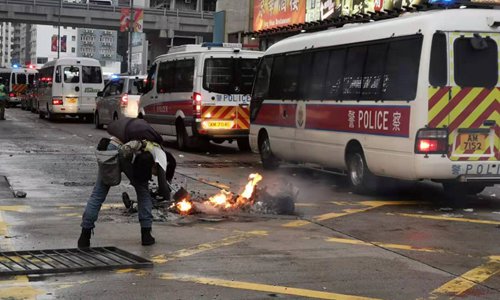Hong Kong rioters politicize religion and race

A journalist takes pictures of a fire set by protesters in Mong Kok, Hong Kong on Sunday. Photo: Wang Cong/GT
Hong Kong rioters are trying to drag religion and race into their months-long protests across the city after a mosque was accidentally sprayed by water cannons used by Hong Kong police on Sunday.
During Sunday's unrest police deployed water cannons to disperse rioters in the Tsim Sha Tsui area, when the cannon sprayed blue dyed water at protesters standing outside the Kowloon Mosque.
Hong Kong police later said the water cannon "accidentally affected the entrance and front gate" of the mosque. The police went to the mosque Sunday night to show their concerns over the incident, which the Muslim Council of Hong Kong said was "a noteworthy gesture."
On Monday morning, Hong Kong Chief Executive Carrie Lam Cheng Yuet-ngor and Commissioner of Hong Kong Police Force Stephen Lo Wai Chung visited the Kowloon Mosque and apologized for the incident.
Muhammad Arshad, the chief Iman of Hong Kong, said he accepted the apology and believed there was a misunderstanding, according to local media reports.
In a tweet, the Muslim Council of Hong Kong acknowledged that the mosque was not the intended target of the police. However, activist and secessionist Joshua Wong tweeted that Hong Kong police "intentionally attacked" the mosque, in an apparent move to incite public discontent with the police force.
Video images show that Hong Kong police exercised more restraint in tackling the current social unrest in the city when compared to video images of police quelling recent massive protests in Spain and Chile.
Ethnic minority groups in Hong Kong are on alert, after some South Asians were accused of being behind a bloody assault on Jimmy Sham Tsz-kit, convener of the secessionist Civil Human Rights Front, on Wednesday.
Protesters using social media networks such as Telegram and LIHKG, which are widely used by protesters in organizing and mobilizing anti-government protests in the past four months, have called for action targeting Chungking Mansions in Tsim Sha Tsui, a commercial and social hub for underprivileged South Asians and Africans. They also suggested firebombing the Kowloon Mosque.
This prompted some South Asians living in Hong Kong to give out bottles of water and other supplies to protesters outside Chungking Mansions on Sunday morning, in an apparent move to placate protesters so that they would not be attacked.
Hong Kong has a long-established South Asian population. Many trace their roots in Hong Kong as far back to when most of the Indian subcontinent was still under British colonial rule. South Asians are considered the city's fastest growing and most poverty stricken ethnicity.
The South Asian population of over 60,000 includes Indians, Pakistanis, Nepalese and others.
Kamal Paudyal, a Nepalese businessman and former vice chairman of the Nepal Chamber of Commerce Hong Kong, has been living in Hong Kong for 29 years. He told the Global Times that South Asians usually haven't taken a stand in the ongoing protests and he has avoided going to protest sites.
He said rumors that South Asians were behind Sham's attack are not true and South Asians have become a target because of the alleged involvement of South Asians in the Yuen Long attack on July 21.
The attack, suspected to have been carried out by triad gangs, was seen as retaliation against rioters who have disturbed local life. Online messages suggested members of the South Asian community were behind the attack and a group of Nepali men were confronted by locals and verbally abused and accused of attacking civilians.
"We are part of Hong Kong and we want peace," said Paudyal.

